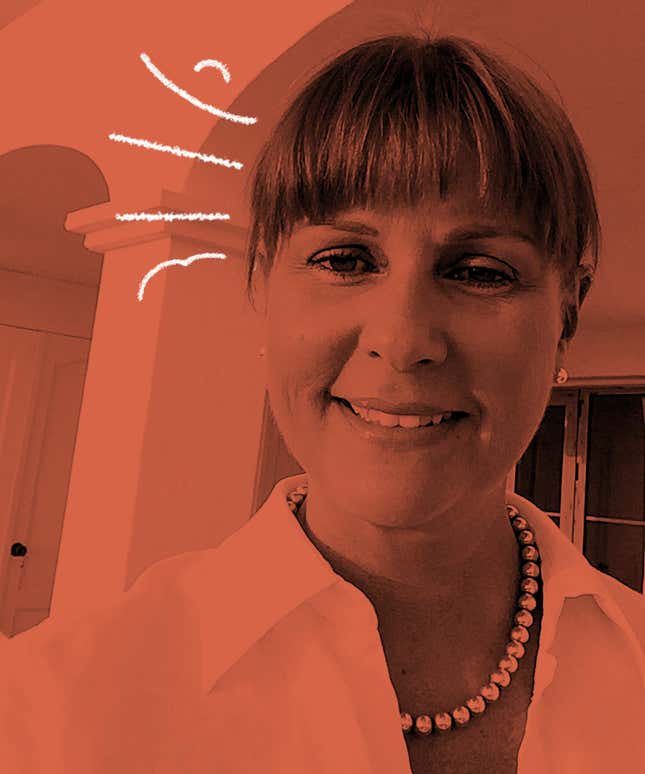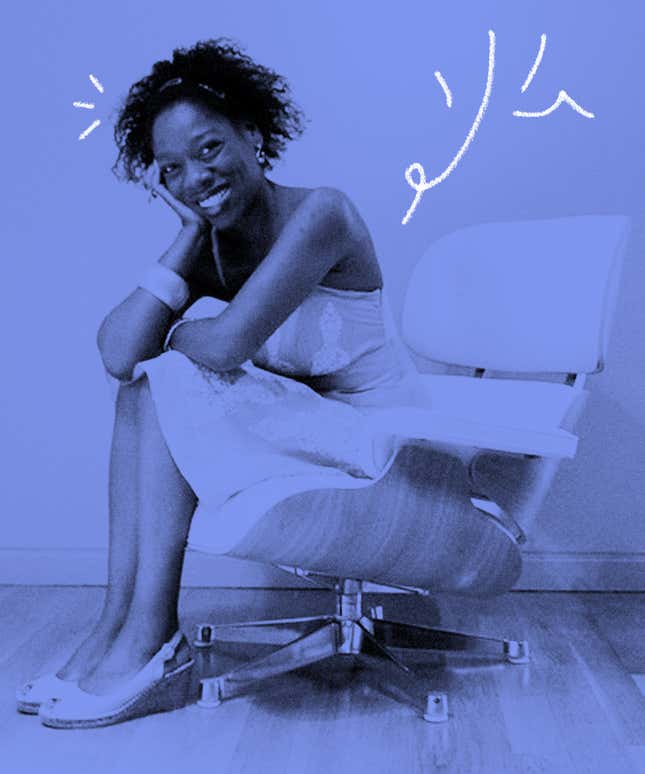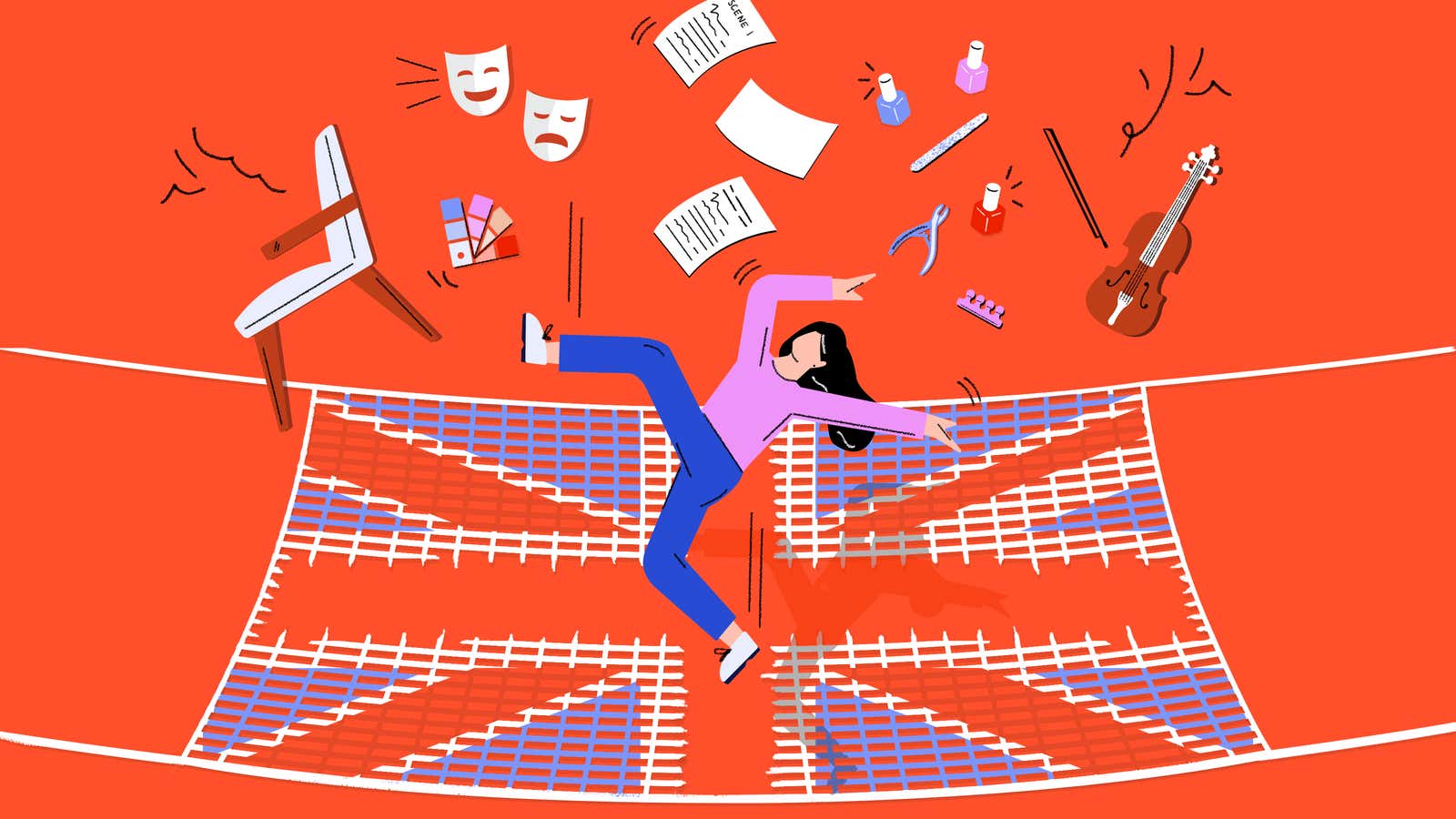As the coronavirus pandemic shreds the global economy, women have been disproportionately swept up in the wave of unemployment. Are government safety nets catching their fall?
The UK is a poignant example. British officials have injected budgetary steroids worth around 15% of GDP into the economy. But despite programs to keep workers on payrolls and to get money to people who worked for themselves, at least 1.4 million self-employed people in the UK—about 2% of the population—have slipped between the cracks, according to government committee estimates.
Men and employees of all stripes are far from immune from the pain. But there are signs that women who work for themselves are being buffeted by the crisis differently, and worse. Many of Britain’s job gains since the Great Recession have been from self-employment, and that’s been even more true for women than for men. Julia Rouse, a professor and employment expert at Manchester Metropolitan University, says a larger proportion of women worked in public sector jobs that were hit by funding cuts after the financial crisis, which partly explains their increase in self employment.
Some women seek out self-employment because it’s flexible, which is often necessary because they end up carrying the majority of unpaid work like child and elder care. At the same time, some sectors that employ large numbers of women have seen permanent roles replaced with short-term contracts, Rouse said. “More educated women have entered self-employment,” she said. “I think this is in the hope of flexibility, but some traditionally female professions—such as journalism and editing—have been casualized.”
Rouse is one of the academics who argue that women-led businesses “have been overlooked and forgotten by the government’s business support schemes.” Her research indicates that women tend to be more reluctant to seek out financing than men, and to have lower levels of savings to support their businesses. Research has also shown that women have carried the brunt of childcare after lockdowns closed schools, making it harder for them to balance their own careers.
A spokesperson for the Treasury said the UK’s Self Employment Income Support Scheme is “among the most generous in the world.” People who don’t qualify for that program can seek other aid, including tax deferrals, support for renters, mortgage holidays, as well as loans and grants.
Quartz interviewed five self-employed women from around the UK about their lives in the Covid era. Some love working for themselves, while others said they would much rather have the stability of regular employment. The reporting shows that having a partner may be its own kind of safety net for some people. Not everyone said they needed a government safety net, while others say the emergency measures could use a rethink. All of them are ready to get back to work.

Katie Collins is a script supervisor for television. She makes sure there’s continuity throughout an episode, so that actors have the props and costumes they’re supposed to for each scene. That’s a lot to juggle when six different episodes of a comedy are shot at one location on a single day. Collins, who lives in Leicestershire, has worked on major shows like Absolutely Fabulous.
In the UK, it’s a line of work that’s almost always done by women and nearly all of them are self-employed, Collins says. There are some advantages to that setup, like flexibility and higher pay. Collins says she would much rather go back to being an employee, like she was at the BBC for 18 years. “It was a marvelous place to work and the training was amazing,” she said.
But most people in that role were made redundant, she says, and have since had little choice but to be self-employed. She misses having things like sick pay, a pension plan, holiday pay, and says that the crisis has exposed the vulnerabilities of being self-employed.
“We’re all employed on a project by project basis,” she said. “None of the jobs are advertised. It’s all word of mouth, who you know.”
Collins, 52, said she feels conflicted about her job. It pays well when she’s working, and she loves the work. But self-employment isn’t something she would ever have sought out voluntarily, and thinks it’s too late for her to retrain for another type of work. What’s more, Collins says the power has shifted so much to the employers that there’s little room to complain about long hours or work conditions.
“You’re at their beck and call,” she said. “Because it’s such a competitive environment, they know they’ve got plenty of other people lined up to do the job.”
Like a lot of solo workers in the UK, Collins has organized her business as a limited company in which she is a director. And like many other directors of limited companies, Collins pays herself a small salary and gets most of her income through dividends. The UK Treasury’s calculations doesn’t count these dividends in its calculations for its emergency support. A spokesperson for the Treasury said the government isn’t able to distinguish between dividends from a person’s own company and those from other sources.
Collins has furloughed herself through the job retention scheme, in which the government pays workers 80% of their previous salary. For her, that comes to about £575 ($717) a month. If she was designated as a sole trader, she may have been eligible for a much more substantial grant.
For now, Collins, who is divorced, has taken a lodger in her home to generate extra income. After her television work halted, she worked briefly at Sainsbury’s grocery chain. “I was assisting the delivery drivers and it was too physically demanding,” she said. “I lasted a day.”

Violinist Hayley Pomfrett, like about 70% of the UK music industry, is self-employed. She had just finished recording for a film in London and was at a gig in Paris when social distancing began in March, shutting down performances and studios. Around 90% of the industry has, at the very least, experienced a reduction in work.
“It dried up more or less immediately,” said Pomfrett, who has played in everything from Hamilton to BBC orchestras, and has performed with artists like Beyoncé and Björk. She’s based in Hatfield, just north of London.
“I had lots of engagements and bookings in the diary,” she added. “Then suddenly, before my eyes, everything got cancelled. I also do a lot of private work for weddings, events, and things like that, and they were all getting postponed.”
Pomfrett has also organized her business as a limited company in which she is a director. And she, too, has furloughed herself through the UK’s job retention scheme, which recognizes her previous salary and not the dividends that are her main income. More than 700,000 people in the UK are estimated to have slipped through this crack.
“It hasn’t been a great outcome,” she said. “I know there are business loans available at my disposal. I haven’t wanted to, at this point, go down that road.”
Overall, Pomfrett said she’s still glad to be self-employed. “I like the variety—if you’re successful you can probably make a bit more money working freelance,” she said. “I trained as classical violinist, but I really enjoy doing the pop side of things. If somebody offered me a full-time job, depending who it was and what the money was, I’m not saying I wouldn’t say yes. But, I’m happy that I chose the direction that I chose.”
And there’s a positive aspect to the lockdown: Pomfrett said she’s been able to spend more time with her son and, since her work has slowed, she’s been handling most of the childcare. “I’m fortunate that my other half is still working,” she said. “If he suddenly got made redundant or lost his job, then I’d feel a lot more worried.”

Olivia Freeman is graduating from St Mary’s University, London, with an acting degree. She is self-employed and had planned to run hands-on drama workshops while auditioning for roles. But now the workshop plan has been put on hold, and a performance she had been preparing for has been postponed.
She’s among a half million or so people in the UK who are starting a new job, or are new to employment or self-employment, and don’t meet the criteria for Britain’s emergency support programs. “It’s really hard if you’re not established and just starting out into this crisis,” she said. “Instead of going insane, I’ve tried to use this time to connect with people I may not have had a chance with if we had not been in lockdown. There are ways of staying proactive but it’s really hard.”
There are signs that television and film projects are beginning to restart, but theaters, which rely on a workforce that’s around 70% self-employed, may face a longer road. Before the crisis, London’s West End attracted 300,000 visitors every week. But these venues have been shuttered since mid-March. Four theaters have gone into administration, and it’s unclear how many will be able to turn a profit if, when they manage to re-open, they have to operate at reduced capacity because of social distancing. The extra cost of personal protective equipment and enhanced cleaning will take a bite out of profits.
For now, Freeman says she has some funds from a student loan and is spending her time making show reels and connecting with casting directors. Instead of going to a studio for commercial auditions, she’s been doing it from home, which meant taking short courses on using Zoom video software. “As a performer, I’ve not had to be on a computer throughout my degree,” Freeman said. “I’ve been on stage or behind a camera. It’s been interesting to take on the roles of director, cameraman, sound man, and do everything at home.”
Leanne Hammond started doing nails and beauty work from her home eight years ago. She had been an account manager at a bank but was looking for more flexibility.
“It was to be my own boss,” says Hammond, who is based in Copley, northern England. Self-employment also helps her to work around some health issues. “I always liked talking to people and being with people, and I’d always loved having my own nails done. So I just went for it and retrained completely,” she said.
Personal services, such as hairdressing and beauty treatments, are likely one of the faster-growing areas of self-employment for women in recent years, according to Office for National Statistics data (personal services fall under “other services” in the government’s figures, a category that also includes the creative and performing arts). There are about 300,000 people in the UK working in the hair and beauty industry, most of them women, underpinning nearly 50,000 businesses.
Starting July 4, barbershops and hairdressers will be able to reopen, according to government guidance, but other “close-contact” businesses like massage therapy, nail bars, and makeup studios are expected to remain closed.
Hammond said she’s started a waiting list for customers who want her to do their nails again. In the meantime she’s making plans for personal protective equipment—things like single-use nail files, face coverings, plastic aprons, and face shields—that will also drive up her costs. Hammond dipped into her savings to cover those expenses.
“It’s debatable whether you can put your prices up to cover all your cost of your PPE, or lose clients because you put your prices up,” she said. “If I say you’re allowed to bring your own, or give a choice to buy one off me, that’s a little bit of help for me.”
She said she hasn’t needed government support because she also works with her husband, which provides extra income. “I didn’t apply for any grants or anything because I’ve still got income from elsewhere, so for me I think it was better going to other people,” Hammond said. “There’s a lot of talk in the industry that because some have fallen between the gaps and they can’t get support, they can’t afford all the PPE. They’re just not going to be able to reopen.”

Karen Robinson went into self-employment ahead of schedule.
After she had a baby in 2005, she decided to change careers, from television series producer and director, to something more compatible with raising a child.
“It was doable with a child, but was not how I wanted to raise my child,” she said in a phone interview. “I had always been interested in interior design and interiors, so I decided to change my career and did an intensive course in interior design.”
Robinson was finishing her studies when the financial crisis hit in 2008. She had originally planned to work for an established studio for five or so years to get experience, but the recession forced her to rethink that plan.
“Everyone was shutting down, not taking on new people, and they were also laying off the people they did have,” she said in a phone interview. “Starting my own company was not my initial wish—at all. But having said that, it’s nice. I’ve been doing it now for 10 years. I’m loving it.”
Now she runs Ruby Red Interiors, an interior design studio based in Folkestone, southeast England, that mainly caters to residential properties. Like all businesses that rely on face-to-face interactions, her work saw a major slowdown. At the height of the lockdown, tradespeople weren’t able to go into homes to carry out work, and building materials were unavailable. Robinson was unable to do on-site home visits.
“I could do the interview over the phone, that was no problem, but it was more the need for me to see the property first hand,” she said. “It can be done online, but I would absolutely prefer not to.”
Robinson hasn’t tapped the government’s emergency loan and self-employment programs, in part because she has a partner who is still employed. “I didn’t really want to take on a loan,” she said. Instead, Robinson used the UK’s universal credit support, a program that offers aid for people who have lost their job or have reduced incomes. “Because I have a partner, I went down the universal credit route and left it at that. I was lucky enough that I could survive on just the universal credit route.”
She agreed with research suggesting that women tend to carry a heavier childcare burden in heterosexual households. While her partner has been “brilliant” with cooking and helping at home, much of the childcare still falls to her. They have two children, and Robinson has been home schooling her youngest during the lockdown.
“When it comes to it, it is the woman who takes the brunt of the childcare,” she said. “I’ve been home schooling him as well as trying to do bits and pieces for my work. It’s me that’s doing that, and I think it’s the same for so many women. You’ve got that plus the housework and your own business. It adds up to more for women.”
